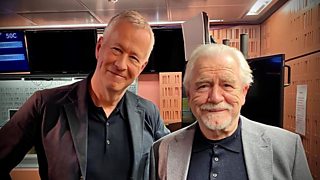Aaron Sorkin: Nine things we learned from his This Cultural Life interview
He’s got an Oscar, a BAFTA, and a whole cupboard full of Emmys. Aaron Sorkin is one of the most successful and beloved screenwriters working today. His CV includes The West Wing, The Social Network, Steve Jobs, Being the Ricardos, and now the hit stage version of To Kill a Mockingbird. On Radio 4's This Cultural Life, he tells interviewer John Wilson about the origins of his unique style, writing his first hit on napkins, and his fear that he’ll never have another idea. Here are nine things we learned.

1. Family dinners formed Sorkin's writing style
Sorkin’s father was a lawyer and his mother a schoolteacher. He says that “everyone in my family is smarter than I am.” Family dinners were a time for challenging conversation, which Sorkin says is where he discovered a love of language and interrogating ideas. “Anyone in my family who used one word when they could have used 10 wasn’t trying hard enough,” he says. “[My father] would encourage being devil’s advocate… That helped with my love of language, and drama is friction… Usually the things I write are conflicts of ideas.”
“I did not write for pleasure. I didn’t tell a story until literally the day after I graduated from college.”Aaron Sorkin
2. He thought he’d be an actor
Sorkin is arguably the most famous screenwriter in the world. Writing was never his goal. “I actually thought I was going to be an actor,” he says. “I was acting in all the school plays and everything. Writing was a chore to be got through for a school assignment. I did not write for pleasure. I didn’t tell a story until literally the day after I graduated from college.”
3. He wrote his first hit on napkins
As an aspiring young writer in New York, Sorkin says he had many jobs, including “dressing up as a moose in Times Square and handing out leaflets, but I was mostly a bartender at Broadway theatres”. That job gave him a lot of downtime, which is when he worked on his first play, A Few Good Men, which went on to become a movie starring Tom Cruise and Jack Nicholson. He wrote it on whatever was to hand. “I was writing A Few Good Men on cocktail napkins,” he says. “I’d go home with my pockets stuffed with cocktail napkins.”

Aaron Sorkin: "I write radio plays... and point a camera at them"
A clip from This Cultural Life: Aaron Sorkin.
4. He had to fall out of love with To Kill a Mockingbird to adapt it
Sorkin’s stage adaptation of Harper Lee’s To Kill a Mockingbird was a huge hit on Broadway and is now playing to packed houses in London. Sorkin says he had mixed feelings when asked to adapt it. “I [thought], this is a suicide mission,” he says. “This book is beloved around the world and holds a sacred place on America’s bookshelf. Nothing good can come of this.” He says his initial draft “wasn’t very good at all” because he was being too faithful to the novel and saying nothing new. He eventually realised he had to “fall out of love with the source material. Stop trying to do a Harper Lee impersonation. Stop pretending I’m writing this play in 1959 and treat it as an original play.” He then chose to shift the focus of the story from Scout, as in the book, and make her father, the lawyer Atticus Finch, the centre, tweaking Lee’s version of the story.
5. He likes courtroom dramas because they make his job easier
Throughout his career Sorkin has returned to the courtroom drama, including in A Few Good Men, The Trial of the Chicago Seven, and To Kill a Mockingbird. There’s a very simple reason: “They lay out perfectly for a dramatist… The jury is a stand-in for the audience. You have in the jury twelve characters who know as little as the audience does. You don’t have to tie yourself into a pretzel trying to deliver exposition without it sounding like exposition. There’s a reason to tell the jury everything the audience doesn’t know.”
6. You should always have a secret in your back pocket
Sorkin says one of the biggest influences on his career was William Goldman, who he calls “the dean of American screenwriters”. Goldman wrote the screenplays for films including All the President’s Men, The Princess Bride, and Butch Cassidy and the Sundance Kid. The latter is Sorkin’s favourite movie. “I love everything about the film, but… I think the star of the movie is the writer.” He says Goldman taught him many lessons but perhaps the biggest was, “Always have a secret in your back pocket”, something the audience doesn’t know about your main character until late into the movie. In Butch Cassidy and the Sundance Kid it was the fact Sundance can’t swim, which Goldman discovered in researching the real men. It’s only revealed at a key moment in the film. “I know exactly how he must have felt when he learned that.”
7. He didn’t invent the walk-and-talk
One of Sorkin’s signatures is the so-called ‘walk-and-talk’. Many of his works have scenes where characters have long conversations while moving. Sorkin says he can’t entirely take credit. “I’m usually only responsible for the talk part… where the director is responsible for the walk,” he says. He credits Thomas Schlamme, his fellow executive producer on The West Wing and director of many episodes, with developing it. “He understood that I was writing things that didn’t really have a lot of visual interest, so very early on, in the pilot episode, he came to me and said… 'This eight page scene that takes place in an office, would you mind if I had them go down the hall to get a cup of coffee while they’re talking… because I’ll be able to pass by desks of people working and there’ll be some movement’. I said sure.”

8. He's usually suffering from writer’s block
Sorkin says he has never developed a writing routine and can only write when he has ideas, which isn’t as often as he’d like. “The fact is that, for me, the hardest part of writing isn’t writing, it’s not writing,” he says. “For the first time in a number of years, I don’t know what I’m doing next. I don’t have an idea. When I don’t have an idea it’s impossible for me to imagine having an idea. It’s the scariest thing.” If this sounds dramatic, he says it’s actually been a common state through his career: “My default position is writer’s block. That writer's block will be interrupted by an occasional bout of having an idea.”
9. He doesn't think visually
“I should say this quietly, because it’s not going to get anyone stampeding to the box office, but… I write radio plays and put them on a stage or point a camera at them,” says Sorkin. He says he is not at all a visual thinker and never envisages what a scene will look like when he’s writing it. This is despite having directed three of his own scripts. “Turns out it’s possible there is a visual element to cinema,” he jokes. “I have to respect that and be good at it, but while I’m trying to get good at it I surround myself with people who are geniuses at it.” Still, in everything he writes, the words should be enough to tell the story. “One of my favourite compliments I’ve ever gotten, very early on I wrote a one-act play that played in the basement of a restaurant in midtown Manhattan at midnight. After the play, a friend introduced me to two friends of his who told me how much they loved the play. It took me a couple of minutes to realise they were both blind… They heard the play and they got every moment of it.”
-
![]()
This Cultural Life
Screenwriter and director Aaron Sorkin talks to John Wilson about his formative influences and experiences.
-
![]()
Kenneth Branagh: Nine things we learned from his This Cultural Life interview
The actor on his Irish roots, love of Shakespeare and his nerves at the 2012 Olympics.
-
![]()
Brian Cox: Nine things we learned from his This Cultural Life interview
The master of stage and screen sits down with John Wilson.
-
![]()
Screenshot
Ellen E Jones and Mark Kermode guide us through the expanding universe of the moving image.




